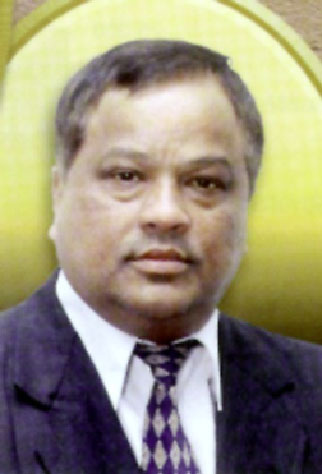The New Building Society (NBS) has moved to the court, challenging the recent $79M judgment in favour of dismissed manager Maurice Arjoon, citing more than a dozen grounds including that it was erroneous and that pension cannot be awarded together with severance and other benefits when an employee is terminated or dismissed.
The Notice of Motion, which was filed by Senior Counsel (SC) Ashton Chase and attorney Pauline Chase last Wednesday, list the New Building Society (NBS), Trust Company (Guyana) Limited, the executor of the estate of Ahmad Khan (deceased), Seepaul Narine and Nizam Mohamed as the appellants and Arjoon as the respondent.
Following the court’s computation from estimates submitted by Arjoon’s lawyers, Senior Counsel Edward Luckhoo and attorney for the bank, Chase, a total of $79,282,801 was awarded to Arjoon on July 20, days after Justice Brassington Reynolds ruled that the former employee was entitled to recover all benefits that were lost as a result of the dismissal. Arjoon and two others were dismissed in June 2007 following the disappearance of $69 million from the account of Bibi Khan.

The court also ordered an award of interest on the sum of $20, 249,520 at 6% per annum from the time of Arjoon’s dismissal until the date of judgment, and thereafter at a rate of 4% per annum until he has been fully paid.
The court ordered that the former manager be paid $4, 144,797 in lieu of notice for three months while his severance benefits, in accordance with the Termination of Employment and Severance Pay Act (TESPA) amounted to $16,104,723.
Additionally, his pension benefits calculated up to June 30, 2017 stood at $59,033,281 resulting altogether, in an award of $79,282,801.
Arjoon’s pension is to attract interest at a rate of 6% per annum from March 1, 2008 to the date of judgment and thereafter at a rate of 4% per annum until fully paid.
The court also declared that Arjoon be paid a monthly pension of $372,498 from the date of judgment, for the rest of his life.
In the Notice of Appeal a total of fifteen grounds are listed.
Due and proper
The first, is that the appellants except NBS are not the due and proper defendants for High Court proceedings and consequently they should have been discharged and awarded costs which are claimed as still being due.
Another ground is that on the basis of the trial judge’s conclusion that Arjoon was wrongfully dismissed by the NBS, the respondent was not entitled to severance pay by virtue of his status and contracts and according to the Termination of Employment and Severance Pay Act.
According to the notice other grounds which necessitated the appeal are that pension cannot be awarded in conjunction with severance or any other benefit that relates to termination or dismissal, that the judge was wrong in law in acting on part of the Systems Manual tendered by the respondent and not on or disregarding the complete Systems Manual tendered by the first named appellants which showed he did not conform with part of the latter and that the judge did not give due attention to the relevant parts affecting the respondent’s conduct in the NBS rules, the Systems Manual, the Pension Rules and the contract signed by him.
Among the other grounds are that the judge’s decision as to the fault or failure of the first named appellants was unreasonable having regard to the evidence adduced, that the decision was erroneous in point of law and that the pension ordered to be paid is not in accordance with the relevant pension rules and the court’s system of arriving at the amount has not yet been disclosed.
The notice stated that the appeal is necessitated by the fact that the respondent’s failure to attend a summoned meeting for discussion (including investigating) with the NBS Board, was not taken into account by the judge even though his action hereto was not in compliance with the order made by Justice BS Roy (now retired) in 2007.
It was stated that the judge did not take into account the “heavy loss” suffered by NBS due to Arjoon’s non-compliance with reasonable practice, with the rules of the aforesaid and their system and practice of operating saving accounts touching various matters including loss of passbooks, acting on communication from overseas without signatures or address or notorization.
Additionally, the over-riding defaults in the respondent’s dealing with the withdrawals from the account of Khan were not taken into account by the judge nor did he consider that the person making the withdrawals from the account was not duly and properly authorized to do so, thereby causing NBS a loss of over $79M.
Falsity
It was stated too that the judge did not take into account the “falsity” of the power of attorney, the numerous errors in it and Arjoon not sending same to the NBS’s lawyer or any other lawyer for checking on its validity before paying out such huge sums on it and that it is clearly fraudulent and illegal nor did he make any check on the local office covering Canada or at any material time on Guyana’s office in Canada.
The notice stated that in the circumstances, the counterclaim was without good cause or reason rejected by the judge, valid exhibits on the part of the appellants were rejected while all the respondent’s exhibits were readily accepted.
In the circumstances, the appellants requested that the rulings and awards be set aside, be reversed and that the counterclaim be ruled in favour of the appellants and that Arjoon be ordered to pay costs.
A date has not yet been set for the hearing of the appeal.
In his judgment, Justice Reynolds, in referencing case law and other jurisprudential authorities, had said that the court found no evidence to substantiate the NBS’s claims that Arjoon committed gross or serious misconduct, warranting his dismissal.
The judge had said that it showed no established rules, standards or procedures stipulated in its manual, which Arjoon was guilty of breaching.
The court noted that by its own admission, NBS, during the trial, acknowledged that there existed poor systemic procedures of adequate checks and balances for detecting gross or serious misconduct, such as that levelled against Arjoon.
The judge pointed out that the NBS highlighted that its systemic procedures were improved only after charges were instituted against Arjoon. The court noted that it was unfair for Arjoon to have been dismissed when the bank had no systems in place to have proved that he was guilty of any wrongdoing.
Justice Reynolds had asserted that such determinations could not be made according to a “Peter pay for Paul and Paul pay for all,” standard.
Upon conclusion of the court’s judgment, Justice Reynolds also ordered NBS to pay costs to Arjoon in the sum of $200,000.






